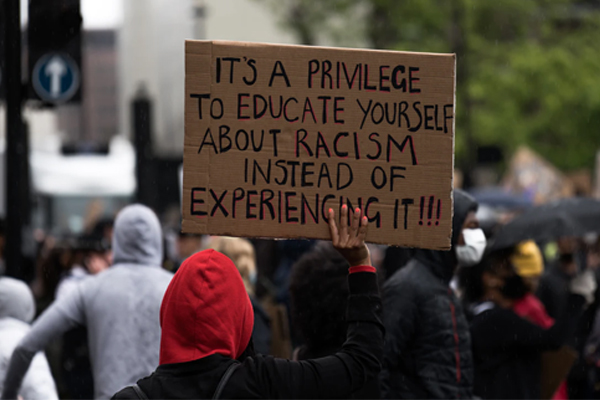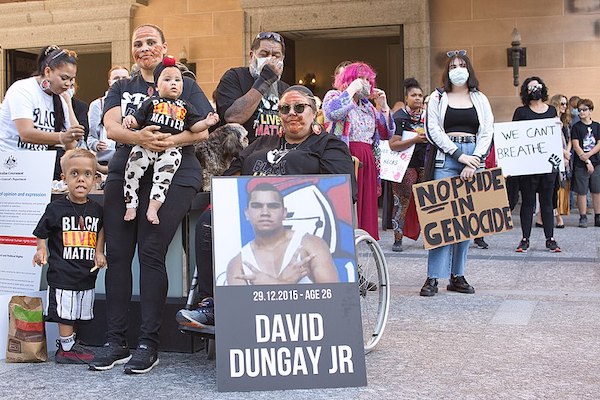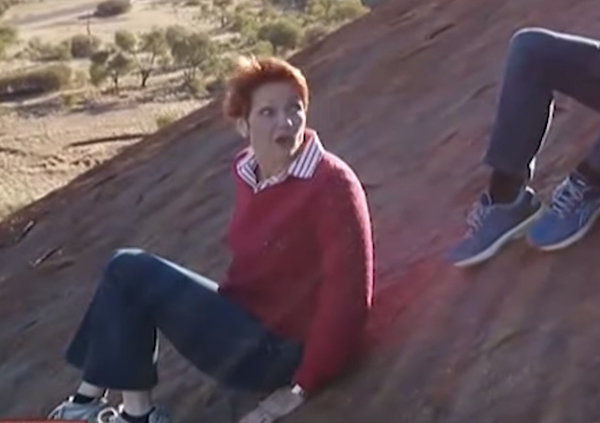The media's continual call for Aboriginal people to counteract the most basic forms of racism suggests its vested interest in propagating this racism, writes Celeste Liddle.
LAST WEEK, I nearly gave up commentary.
I have, over the six years that I have been doing this, threatened to quit commentary many times. At times it can be a tough gig.
Writer's block is real. My most productive time when it comes to writing is around 10pm, which is rather inconvenient when I need to get up the next day for work. And sometimes, particularly on some really hard topics, the need to engage with these issues emotionally in order to unpack them in a way with which an audience can identify can take a toll.
But last week, I'd had enough and I took to social media to tell people. In a month where it felt Aboriginal people and other people of colour were continually under attack in this country, the call on Aboriginal commentators to respond to this and therefore convince the public of our humanity reached boiling point. I – and other Aboriginal people I knew – expressed disillusionment and exhaustion. It was just too much.
In the space of merely four weeks, we had the Liberal Party leadership battle and the pity appointment of Tony Abbott as the "Envoy for Indigenous Affairs" — even though no one asked for him. We had the retrial of the Bowraville children murders dismissed, based on a lack of new evidence in the case of one of the three children (although I note the current push to move this to the High Court).
Two children drowned in the Swan River following a police pursuit after reports they had been "jumping fences". A nine-year-old school girl refused to stand for the anthem at her school's assembly and rightwing commentators went into meltdown. A Herald Sun cartoonist drew a racist and misogynistic cartoon of tennis players — caricaturing one as a Jim Crow-era throwback, while erasing the Japanese-Haitian heritage of another in a bid to portray "White" innocence. Some Tasmanian football players then took the same caricature one step forward by dressing as Serena Williams using blackface.
Meanwhile, another Aboriginal man died in custody and a coronial inquest into the death of a pregnant Aboriginal woman, potentially due to racism and neglect by the medical system, began.
As I said, this was merely a few weeks in the political landscape of this country. Yet my frustration wasn't at the continual torrents of racism that Australia managed to manufacture and the relentless hit-ups I received from the media to respond to it. It was the fact that, most of the time, the media was only interested in calling on Aboriginal comments for the "easy topics".
In all requests I received, bar one, people wanted my slant on the racist cartoon, the blackface incident or the girl who wouldn't stand for the anthem. They weren't remotely interested in delving into the deep systemic issues which led to almost all of those other situations. Most wanted Aboriginal opinion for the purposes of producing clickbait and, judging by the conversations I was having with other Aboriginal women at this time, I wasn't alone in my cynicism here.
It speaks volumes about the lack of progress in this country. I have been writing opinion pieces for six years. People can easily find my thoughts on the national anthem, blackface, Invasion Day and the many instances of racism which are blatant. Clearly, though, blatant racism is the only type of racism the mainstream Australian media believes exists. In my time of writing, I have also expressed views on the policing of Aboriginal people, the neglect of Aboriginal crime victims and the culture of terra nullius, which continues to permeate Australian society, leading to a deep ignorance of pre-colonisation, frontier violence, assimilation programs and continuing impacts on communities.
'In Berlin, I am not an Aboriginal person living under the unique circumstance of Australian racism.
I state I'm Aboriginal overseas and people don't tend to erase my history, deny my humanity or criminalise me.'
No matter how much these views are expressed, however, mere months later Aboriginal commentators are called on again to explain why blackface is offensive, why celebrating Australia Day is erasive and why the anthem is erroneous. The media screams these headlines while ignoring the fact that more Aboriginal kids have been incarcerated, more Aboriginal people are dead and more of us are vilified in the very lands our ancestors have lived on since time immemorial.
In a moment of frustration, I expressed my want to get out of Australia and go to my "happy place" — otherwise known as Berlin. It took literally seconds for someone to get back to me and explain that Germany has issues too. Firstly, I'm no dummy; not only does German history explicitly demonstrate this racism (then attempt to acknowledge it via legislation and public memorials), but contemporary issues such as the so-labelled "Kebab murders" and the rise of the German Right in recent elections, point to racism being alive and well there.
These online people didn't get my meaning, clearly. I wanted to be elsewhere because in a place like Berlin I am not an Aboriginal person living under the unique circumstance of Australian racism. I state I'm Aboriginal overseas and people don't tend to erase my history, they don't deny my humanity and they don't criminalise me. They tend to be interested and respectful. I'm not on the back foot, continually having to prove that racism exists, that Indigenous people experience the brunt of it via being the displaced traditional owners and that our lives matter.
This cycle can't keep going on. The continual call by the media for Aboriginal people to counteract the most basic forms of racism suggests not only that Australia is failing to address the structural and systemic racism, which allows the space for blatant racism to fester while human rights abuses are ignored, but also that the media has a vested interest in propagating this racism.
Perhaps for their profit margins or perhaps because, on the whole, most media organisations are run by powerful White men who wish to maintain their power. Either way, we're tired of your deficiencies. The time to do better is well overdue.
This article was originally published on Eureka Street and is republished with permission. Celeste Liddle is an Arrernte woman, the National Indigenous Organiser of the NTEU and a freelance opinion writer and social commentator. Read more from Celeste on her blog Rantings of an Aboriginal Feminist or follow her on Twitter @Utopiana.
 This work is licensed under a Creative Commons Attribution-NonCommercial-NoDerivs 3.0 Australia License
This work is licensed under a Creative Commons Attribution-NonCommercial-NoDerivs 3.0 Australia License
Support independent journalism Subscribe to IA.












